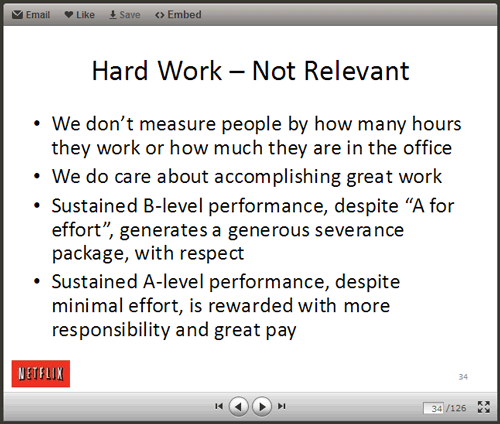Company culture is incredibly fragile. It’s hard for founders/CEOs/execs to understand how little faith and trust people have in us when we stand up at a meeting and say “we believe in our culture” or “we put values first.”
That skepticisim has often been built up over years or decades of being let down. People joined companies that claimed to keep culture sacred and found that they did anything but. They heard about core values that were more important than raw performance or the bottom line, only to see those values trampled upon when reviews or company strategy butted up against them.
The following story happened last week at Moz. And it’s one of the best examples I’ve got of just how fragile your values can be.
A couple weeks ago, Sarah Bird, our COO, sent out invitations to an optional morning discussion of the Netflix Culture Slide Deck (which is worth a look if you haven’t seen it). I didn’t attend (mostly because it was scheduled at 8:30am, which is still R.E.M. sleeping hours for me), but heard good things about it. Zach, who joined our technical writing corps in March, was also part of the discussion.
Sarah noticed that during a particular discussion about slide 34 on “hard work” vs. “good work,” Zach seemed to express some hesitation. He wondered whether we, at Moz, were good about valuing the quality of effort put in over the appearance of hard work. Sarah expressed her feelings that Moz is not a place where being in the office until 10pm is valued, but that, in fact, lots of people work from home regularly, and if you’re meeting your (usually self-established) deadlines, there’s no requirement to have facetime.

(slide 34 from the Netflix Culture Deck)
Zach was skeptical.
He later popped his head into Sarah’s office to ask if she could schedule a few minutes to chat. She told him she had time just then, and asked what was on his mind. I’ll replay the conversation from there as best I understand it (though keep in mind this won’t be a perfect recitation):
Zach: Remember how we talked about hours in the office or seeing people staying late not mattering at Moz?
Sarah: Yeah.
Zach: And we also talked about how important it is for everyone in the company, at any level, to have the courage to call out others for not acting TAGFEE.
Sarah: Of course.
Zach: Well, several weeks ago, I was working at my desk when you walked over and asked if anyone had seen Kenny. It was ~4pm and I said that he’d just left for the day. You had a dissapointed look on your face and as you turned around, you said “Well, he’s not going to get very far.” That really stuck with me, and seemed to suggest that hours in the office are important and leaving early isn’t acceptable, even though I’m pretty sure Kenny’s on schedule with all his work.
Sarah: Oh shit.
Zach:…
Sarah: I had Kenny’s keys in my hand! That’s what I meant when I said he wasn’t going to get very far. He couldn’t get far because he didn’t have his keys!
Zach and Sarah had a great laugh about this. In fact, everyone I’ve told the story to has thoroughly enjoyed the hilarity of the miscommunication. As Sarah noted when she first told me, you couldn’t write a better script for an office sitcom episode.
But it reveals deeper issues – those of trust, responsibility, courage, and the skepticism toward values I mentioned above. There can be little doubt that in this situation, Zach was brave, and acted admirably. He could have, more easily and with less risk, stayed quiet about the issue and never uncovered the misunderstanding. However, if he’d felt totally comfortable from day one about Moz embracing TAGFEE, he would have asked Sarah about Kenny’s inability to go very far when she was first looking for him, or later during the Netflix discussion. His reticience is totally understandable – he was cautious and private about his concerns so he wouldn’t make Sarah look bad in front of the group (in the event that she really had been talking about Kenny’s future career opportunities).
This incident made me wonder – how many misunderstandings like this have there been over the years? How many were ever cleared up? How many people have heard a similarly innocent comment from a senior person at the company and questioned whether we truly believe in our values?
It’s unlikely the answer is zero.
One of the hardest truths I’ve learned about culture, values, and building a company is that the founders/execs must assume that their every step is being scrutinized, and that the 100 times you did the right thing don’t build up any immunity to criticism or doubt for the 1 time you appeared hypocritical, or in violation of your stated culture. I know that the bigger we get, the harder it will be to keep our values sacred. The only solution seems to be encouraging dialogue, having multiple lines of communication, and making sure that everyone in the organization feels like they have people to talk to if non-TAGFEE behavior is taking place (or appears to be).
Time will tell whether these solutions are enough. In the meantime, I hope everyone at Moz does what Zach did, and bravely talks it out. With luck, we’ll get more funny stories and less uncertainty about values out of the process.
p.s. While the Netflix deck is really interesting, we have some substantive disagreement around parts of it. I might write about those in a future blog post.

